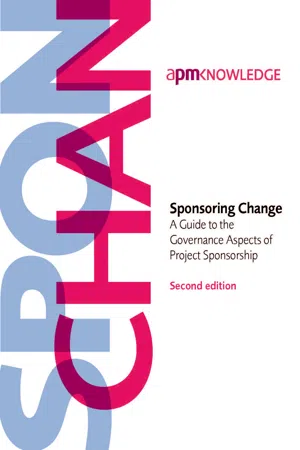![]()
1
Purpose
The purpose of this document is to guide board members and senior managers to adopt good practices regarding sponsorship of change projects. Effective sponsorship has been shown to be one of the key factors in delivering change project outcomes successfully.
The guide will help:
■improve understanding of the board’s role in applying effective sponsorship of change;
■improve understanding of the role of the project sponsor in governance of any change endeavour;
■develop and improve sponsor competence;
■explain why a sponsor needs to be accountable for project success;
■assure board members, senior managers and others that good sponsorship and robust governance requirements are applied across all projects and programmes managed in their organisation, reduce risks to the organisation and maximise the benefits realised from projects and programmes; and
■ensure that there is a more constructive and productive relationship with those delivering the change project.
![]()
2
Introduction
“The effectiveness of the project sponsor is the best single predictor of project success or failure”
NAO annual review of projects – 2015
Organisations spend a significant proportion of their annual budgets on projects, and projects are the primary vehicle for achieving an organisation’s strategy. Many of the reasons cited for project failure are linked to the role of the project sponsor. Despite the importance of the role, there has been little guidance for the individual who has been asked to sponsor a project.
This guide has been updated from the original version published in 2009 and explains:
■why every project1 needs a sponsor;
■how the board’s support is important for sponsor and project success;
■the attributes of an effective sponsor that are critical to success;
■what a sponsor does for the business;
■what a sponsor does for a project manager;
■some useful pointers in choosing and selecting a suitable sponsor (Appendix 2).
Sponsors are variously titled, according to practice within their organisations, and may be located at different organisational levels. Whatever a sponsor’s level of authority, at a minimum they will be accountable for the project business case, budget, and high-level stakeholder engagement.
The programme or project sponsors are accountable for the realisation of desired outcomes and benefits from any investment. They provide the governance link between the organisation’s senior executives (the board2) and the management of each project.
This APM Sponsoring Change guide complements the APM Directing Change guide which sets out good practice for the overall governance of enterprise-wide project management and individual projects – one of the core principles being that every project or programme shall have a named and competent sponsor. Directing Change also explains the board’s responsibility for the overall governance of change and change management across the enterprise and provides checklists for boards and sponsors regarding their governance responsibilities.
The board is accountable for overall sponsorship of the organisational strategy, ensuring a clear line of sight with business-as-usual operations and individual projects and programmes in the organisational portfolio. Clear governance arrangements should be in place for an organisation to undertake any complex change activity. The board is therefore ultimately accountable for ensuring that an appropriate sponsor owns each programme and project and holding them to account for that delegated responsibility, including acting on their behalf in setting the appropriate tone and leadership.
Projects exist to change organisations, their services, performance and/or reputation and impact upon the business to some extent. Business strategy emanates from the board and will guide changes to the business through projects. It is vital to the board that their strategy is turned into reality, confirming the benefits (qualitative and quantitative), understanding the risks and defining boundaries, constraints and dependencies. The board, in setting the agenda for good sponsorship, should consider the important principles described here and ensure they are understood and underwritten.
Section 6 of this book describes how the sponsor provides accountability, confidence, transparency and understanding to the business, by performing the following advocacy and leadership activities:
Section 7 describes how the sponsor provides leadership to the project and project manager, and creates the conditions for the project manager and the project team to succeed, by performing the following activities:
1 The terms projects, programmes, project management and programme management are defined in the APM Body of Knowledge, and the PMBOK, BS6079. For brevity, this guide uses the term ‘project’ as being inclusive of project-based programmes and portfolios. Thus, when this guide recommends that every project should have a sponsor, it implies, equally, that every programme and portfolio should have a sponsor.
2 In this guide, the term “board” refers to executive boards, their equivalents in the public sector and to councils in companies limited by guarantee. It does not refer to project boards, which are described separately in section 4 – Organisational context.
![]()
3
Research and reviews
Reports continue to be produced highlighting the failures of high-profile projects, or the poor project delivery success rates in particular sectors. Over the past couple of decades, the focus has shifted from the methods and tools of project delivery, to the people running and leading them. Many reports and academic papers have been written emphasising the importance of effective sponsorship and sponsors in achieving successful project outcomes. Key...


